Understanding mental wellness means looking at both what helps and what doesn't. Many people chase things they think will improve their mental health. Often, these pursuits leave them feeling emptier. It's important to recognize which factors truly support positive mental health. This way, you can focus your energy on what really makes a difference.
Overview
Positive mental health is more than just the absence of mental illness. It includes emotional well-being, psychological functioning, and the ability to face life's challenges. It also involves maintaining meaningful relationships and a sense of purpose.
Key parts of good mental health include:
- Emotional stability
- Resilience during tough times
- Healthy self-esteem
- Strong social connections
- Ability for personal growth
Research shows that good mental health helps people reach their potential. It also helps them handle stress, work well, and contribute to their communities. This perspective indicates that mental wellness includes many connected factors, not just one.
Why Understanding the Factors That Support or Harm Mental Health Is Essential
Understanding what boosts positive mental health helps you choose where to spend your time and energy. It's also key to see what doesn't support mental wellness, even if popular beliefs say otherwise. Using resources like our Mental Health Issues Guide helps you tell apart what's true from what's not.
Many people spend years chasing things they think will improve their mental health. Often, these things either don't help or even harm their well-being. This wasted effort can delay access to helpful resources and strategies.
Brief Mention of Misconceptions Around Mental Wellness
Mental health myths are everywhere—in popular culture, social media, and even from friends and family. Some think constant happiness means good mental health. Others believe certain achievements will fix all problems. Some even say that thinking positively can cure mental illness. Myths prevent real action. They also set up unrealistic expectations, which can cause disappointment.
Understanding Positive Mental Health
Knowing what positive mental health really is can dispel myths and unrealistic expectations.
Definition of Positive Mental Health
Positive mental health is a state of well-being. It means individuals feel good about themselves and their lives. They can also function well in daily activities and relationships. This doesn't mean they are always happy or free from negative emotions. It shows they can manage both good and bad experiences in healthy ways.
Positive mental health includes feeling capable of meeting life's demands. It means keeping steady during hard times, enjoying strong relationships, and finding meaning in daily tasks. People with positive mental health may still feel sadness, anxiety, or frustration. They have the skills and resources to handle these feelings positively.
Key Components
- Emotional Stability
Emotional stability in mental health means keeping moods steady without drastic swings. It doesn't mean you won't feel strong emotions. It's about feeling right for the moment. You should also be able to get back to your usual self after emotional events.
- Resilience
Resilience and mental health are closely linked. Resilience is about bouncing back from tough times. It means adapting to change and still doing well when things get hard. Resilient people face the same challenges as others. They have mental flexibility and coping skills. These traits help them handle difficulties better.
- Self-Esteem
Healthy self-esteem is vital. It means seeing your strengths and weaknesses clearly. You should avoid being too hard on yourself or thinking too highly of yourself. People with healthy self-esteem feel inherently valuable while acknowledging areas for growth.
- Social Connection
Social connection is key to mental wellness. Humans are social beings, and isolation can harm mental health. Meaningful relationships protect and improve well-being. Our Complete Guide to Understanding Anxiety explores how relationships impact mental health. It highlights the link between social support and managing mental health conditions.
How Lifestyle, Habits, and Thoughts Influence Mental Well-Being
Daily choices add up over time and greatly affect mental health. Your overall wellness depends on what you eat, how you exercise, sleep quality, stress management, and thought patterns. These factors influence mental health consistently, rather than creating sudden changes.
Research on lifestyle factors that affect mental health includes:
- Physical activity
- Nutrition
- Sleep
- Substance use
- Social engagement
- Meaningful activities
Small, steady changes often work better than big, quick fixes.
Thought patterns also have a strong impact on mental health. Cognitive approaches show that how you view situations shapes your emotions and actions. Spotting and changing unhelpful thoughts is key to good mental health.
Factors That Contribute to Positive Mental Health
Understanding what genuinely supports mental wellness helps focus on effective strategies.
Physical Health and Regular Exercise
Physical health impacts mental well-being in several ways. Regular exercise can lower depression and anxiety, often as effectively as medication. It also boosts sleep, energy, and self-esteem. Movement releases endorphins, cuts stress hormones, and distracts from worries.
You don't need intense workouts to gain mental benefits from physical activity. Regular moderate activities, like walking, gardening, dancing, or gentle yoga, can help. The key is consistency, not intensity.
Balanced Nutrition and Proper Sleep
What you eat affects brain function and mood. Eating whole foods, omega-3 fatty acids, and enough protein helps make neurotransmitters. These neurotransmitters can stabilize your mood. Too much sugar and refined carbs can cause blood sugar spikes, leading to anxiety and mood swings.
Sleep quality greatly impacts mental health. While you sleep, your brain handles emotions, saves memories, and balances mood chemicals. Lack of sleep hurts most mental health problems. Good sleep helps build resilience and emotional stability.
Healthy Relationships and Social Interactions
Strong connections support mental health. In contrast, isolation raises the risk of depression, anxiety, and other issues. Quality matters more than quantity in relationships. Close, supportive relationships boost mental health more than many shallow ones.
Healthy relationships involve mutual respect, genuine communication, appropriate boundaries, and reciprocal support. Toxic relationships hurt your mental health. It doesn't matter how many friends or family you have. Manipulation, constant criticism, and emotional abuse take a toll.
Purpose, Gratitude, and Mindfulness Practices
Finding meaning and purpose in life contributes significantly to positive mental health. Purpose might come from work, relationships, creative pursuits, volunteering, or spiritual practices. Engaging in meaningful activities matters more than passing time.
Gratitude practices shift attention toward positive aspects of life without denying difficulties. Regular gratitude reflection correlates with improved mood, better sleep, and increased life satisfaction. Writing down three things you're grateful for each day can lead to real benefits.
Mindfulness means focusing on the present moment without judging it. This practice helps reduce thoughts about the past or worries about the future. It also boosts awareness of thoughts and feelings that affect behavior. "How to Calm Anxiety Naturally" offers mindfulness techniques to help manage anxiety symptoms.
Professional Help and Therapy When Needed
Recognizing when to seek mental health help is key to good mental health. Get help from a professional if symptoms persist, disrupt your daily life, or include thoughts of self-harm.
Therapy offers tools and insights that self-help often can't match. Recognizing psychiatric conditions, as explained in "What Is a Psychiatric Disorder?" helps you know when to get professional help.
Common Misconceptions About Mental Health
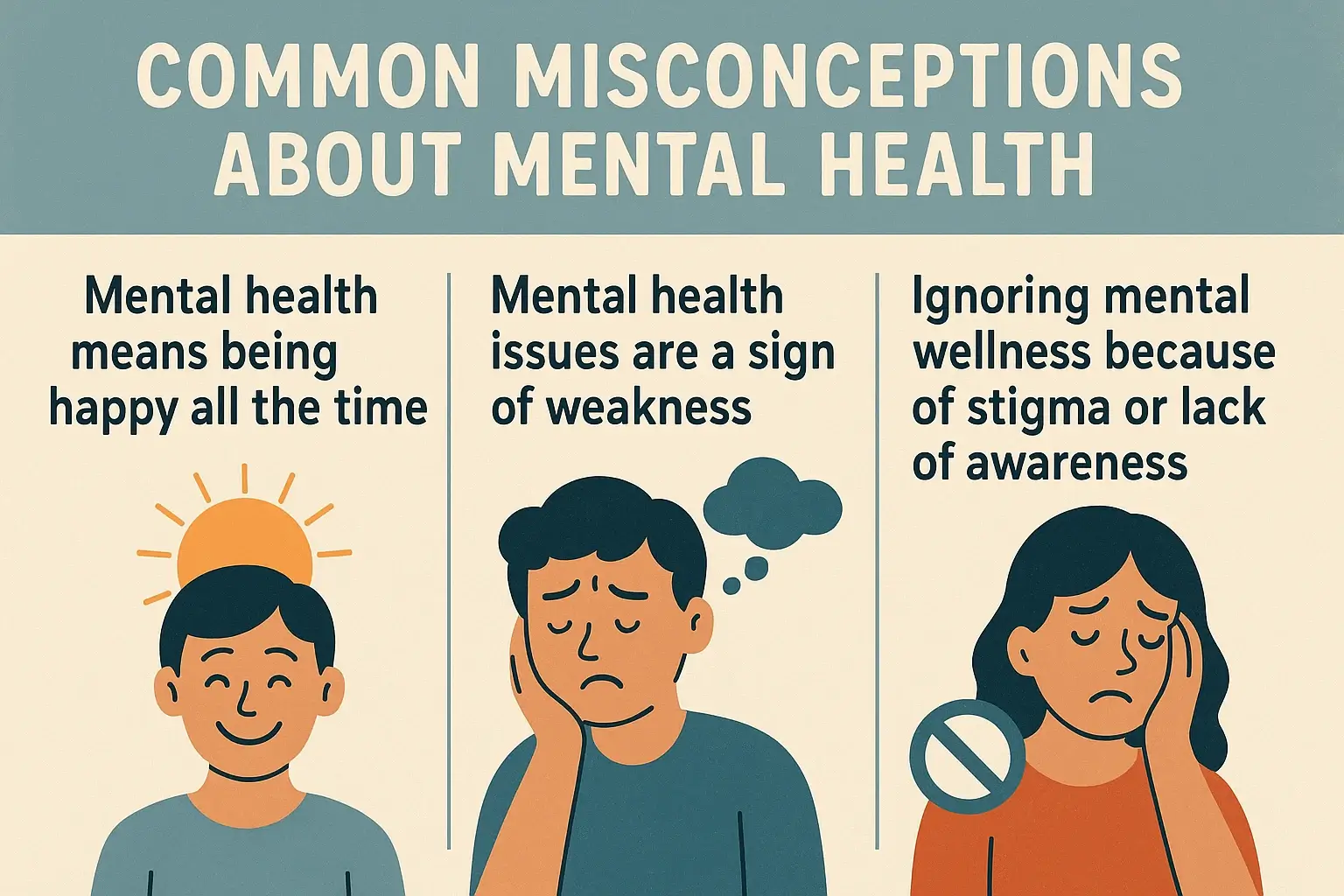 Busting myths helps people find better strategies. This way, they won't waste energy on the wrong paths.
Busting myths helps people find better strategies. This way, they won't waste energy on the wrong paths.
Myths, Such As Mental Health Means Being Happy All the Time
One common myth says that positive mental health means constant happiness. This unrealistic view makes people judge themselves harshly. They feel bad about normal feelings like sadness, frustration, or anxiety. True mental health means feeling a wide range of emotions. It also includes having the skills to handle tough feelings.
Toxic positivity harms mental health. It happens when people deny or hide their negative feelings to appear positive. This suppression worsens mental health. It halts healthy coping with tough experiences. It also creates shame about normal human reactions.
Belief That Mental Health Issues Are a Sign of Weakness
Mental health problems do not show weakness or character flaws. This misconception stops many from seeking help. These conditions arise from a mix of genetics, brain chemistry, life experiences, and environmental factors. They are not a sign of weakness, like diabetes or cancer.
This stigma affects certain groups, as shown in our Men's Mental Health Awareness Month content. Cultural ideas about masculinity often make it tough for men to share their struggles or ask for help.
Ignoring Mental Wellness Because of Stigma or Lack of Awareness
Some people ignore mental health until a crisis hits. They think that focusing on it brings problems, or that it only matters when things go wrong. This avoidance can lead to missed chances for building resilience and skills that support mental health.
A lack of mental health education fuels this avoidance when people don't grasp how mental health functions or what helps it; they can't make smart choices for their wellness.
Which Factors Are Not Important for Positive Mental Health
Knowing what doesn't help mental wellness can save energy. It helps us focus on what truly matters.
Exploring Distractions That Seem Important But Are Not Beneficial
Many things claimed to be vital for happiness and well-being add little to true mental health. Recognizing these distractions helps to redirect focus toward factors that truly matter.
Many people are surprised by what isn't crucial for positive mental health. Popular culture and marketing often highlight these factors as the keys to happiness and success. Critical examination reveals they don't deliver promised mental health benefits.
Overemphasis on External Validation
External validation in mental health happens when self-worth depends on others' approval, recognition, or looks. Positive feedback feels nice at first, but depending on it leads to fragile well-being. This well-being can collapse when approval fades or achievements end.
Wealth beyond basic needs shows little link to mental health or life satisfaction. Once financial security is achieved, extra money doesn't boost mental well-being much. Many give up their health, relationships, and happiness in the pursuit of wealth. They believe that money will bring joy.
Popularity and social status also fail to provide lasting mental health benefits. Social media metrics, like followers and likes, create a false sense of connection. Meanwhile, loneliness and depression rates have risen alongside social media use. Social media affects mental health. It can harm well-being in many ways.
Worrying too much about looks, beyond basic health, saps energy. This energy could boost true mental wellness. Self-care is important, but focusing too much on looks can harm mental health. It can lead to increased anxiety, depression, and eating disorders.
Avoidance Behaviors
Avoidance strategies can harm mental health. People often use them to escape tough emotions or situations. While they may offer short-term relief, they usually make problems worse in the long run. They also stop the development of real coping skills.
Excessive social media use is a common form of avoidance. It distracts people from uncomfortable feelings and real-life challenges. This habit can cause anxiety. Constant comparison and too much information keep real issues from being solved.
Denial of problems or emotions feels protective, but can be harmful. Ignoring issues allows them to grow and prevents early intervention. Pretending problems don't exist only makes things worse.
Overworking is another socially accepted form of avoidance. It may look productive, but it often masks deeper issues. These can include relationship problems or personal struggles. Overworking can lead to burnout, hurt relationships, and cause health problems. These all damage mental wellness.
Toxic Positivity and Suppressing Emotions
Suppressing emotions' mental health consequences include increased anxiety, depression, and physical health problems. Emotions contain important information about needs, boundaries, and situations requiring attention. Hiding this information stops proper responses. It also builds psychological tension from keeping up false fronts.
Toxic positivity means pushing a positive outlook in every situation. It denies real struggles and pain. This is different from healthy optimism, which accepts challenges but keeps hope alive. Toxic positivity overlooks real problems. Phrases like "think positive" or "everything happens for a reason" can dismiss genuine feelings. This stops real emotional processing and support.
Understanding conditions like depression, highlighted in our Depression vs. Bipolar Disorder resource, shows that positive thinking alone can't solve mental health issues. These need proper treatment and support.
The Role of Environment and Lifestyle
External factors significantly influence mental wellness in ways that people often underestimate.
How Work, Social Environment, and Digital Exposure Affect Mental Health
Workplace environments affect mental health. They do this through stress levels, social interactions, autonomy, and work-life balance. Jobs involving high demands with low control particularly harm mental health. Toxic work cultures hurt well-being. Bullying, discrimination, and unrealistic expectations matter more than salary or prestige.
Social environments, including neighborhoods, communities, and regular social contacts, influence mental health. Supportive communities enhance resilience, while unsupportive or hostile environments increase mental health risks. The links between environment and mental health in our Acquired Psychiatric Disorders content show how circumstances affect mental wellness.
Constant connectivity, news, and social media now impact mental health more than ever. Information overload, comparison culture, and less in-person interaction all lead to anxiety and depression. Setting boundaries around technology use supports cognitive health.
Recognizing Unhealthy Habits That Harm Mental Wellness
Many habits can harm mental health. People often don't see these habits as issues. Perfectionism drives constant dissatisfaction and anxiety while preventing the enjoyment of accomplishments—chronic people-pleasing sacrifices genuine needs and boundaries while breeding resentment.
Rumination involves repeatedly thinking about problems or past events without moving toward solutions. This habit can boost depression and anxiety, even if you feel productive. It happens when you keep "thinking about" problems. Breaking rumination patterns through mindfulness and behavioral activation significantly improves mental health.
Catastrophic thinking involves imagining the worst possible outcomes for situations. Planning for difficulties is helpful, but catastrophizing can lead to anxiety and inaction. It doesn't solve problems. Recognizing and challenging these thought patterns supports better mental health.
Building Supportive Daily Routines for a Balanced Mindset
Mental wellness habits integrated into daily routines produce better results than sporadic interventions. Morning routines include brief mindfulness, physical movement, and a healthy breakfast. Evening routines supporting sleep involve limiting screens, gentle stretching, and calming activities.
Regular routines provide structure that supports mental health, particularly during stressful periods. Sticking to a regular sleep schedule, meal times, and activities boosts mood and energy. It also cuts down on daily choices that can tire you out.
How to Strengthen Positive Mental Health
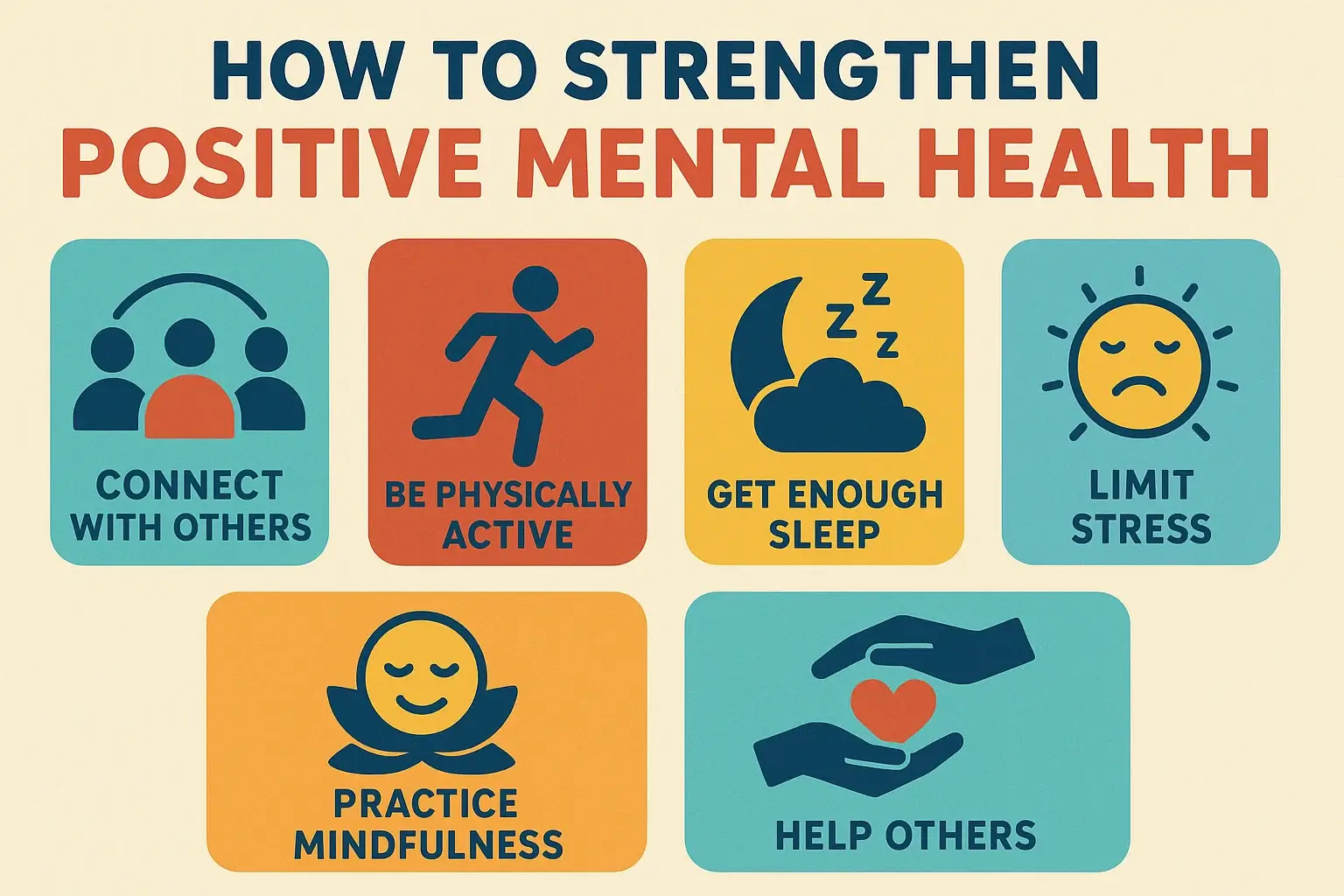 Practical strategies for building and maintaining mental wellness work better than vague aspirations.
Practical strategies for building and maintaining mental wellness work better than vague aspirations.
Self-Care Strategies That Actually Work
Mental health self-care goes beyond spa days or treats. It includes regular practices that support well-being. This means looking after your physical health. Get enough sleep, stay active, and eat well. Also, take care of your emotional and social needs.
Self-care involves setting boundaries for your time, energy, and relationships. Saying no to draining commitments is key. It safeguards your time for rest, relationships, and fun activities. This helps you stay strong.
Practical self-care means facing problems instead of avoiding them. Tough decisions, important talks, and big tasks can be better self-care than quick escapes or treats.
Setting Boundaries and Managing Stress
Boundaries are key to mental health. They define what treatment is acceptable and what isn't. Clear boundaries help you manage your time and energy. They prevent resentment and reduce conflict. This also fosters genuine intimacy by creating a safe space.
Stress management has two key parts: tackling stressors and developing healthy ways to cope with unavoidable stress. Problem-focused coping deals with stressors directly through planning and action. Emotion-focused coping helps manage feelings. It means seeking help, viewing things in a new light, and being gentle with yourself when change isn't possible.
Our Guide to Anxiety in Kids helps parents see when their children need support for stress and anxiety. Women's Mental Health Awareness Month focuses on stressors that impact women's mental health.
When to Seek Professional Mental Health Support
Professional mental health support is key when self-help isn't enough. It's crucial if symptoms disrupt your daily life or if you have thoughts of self-harm. Many people wait too long to get help. They suffer when effective treatment is available.
Professional support includes:
- Therapy
- Medication, if needed
- Support groups
- Intensive programs for severe conditions
Different approaches work for other people and situations. Finding the right support sometimes requires trying many options.
Knowing the difference between normal stress and clinical conditions is key. Check our resource on the difference between stress and anxiety. It helps you see when you need professional help.
Conclusion
Understanding what doesn't matter for mental health helps you focus on what does. Meaningful relationships, a sense of purpose, good health, and coping skills are more important than external validation, wealth, popularity, or appearance.
Avoiding toxic positivity is key. Recognize real struggles. Set boundaries with technology and unhealthy relationships. Seek professional help when you need it. These actions support mental health better than chasing external success.
At Gendrics, we provide mental health education. This helps you distinguish evidence-based methods from common myths.
To boost your mental health, focus on the basics:
- Sleep
- Movement
- Nutrition
- Relationships
- Stress management
These are key elements for a healthier mind.
Forget about dramatic fixes or quick solutions.
Direct your energy toward what truly supports mental wellness. Let go of pursuits that waste time and deliver little. This clarity builds strong mental health. It boosts your quality of life in every area.

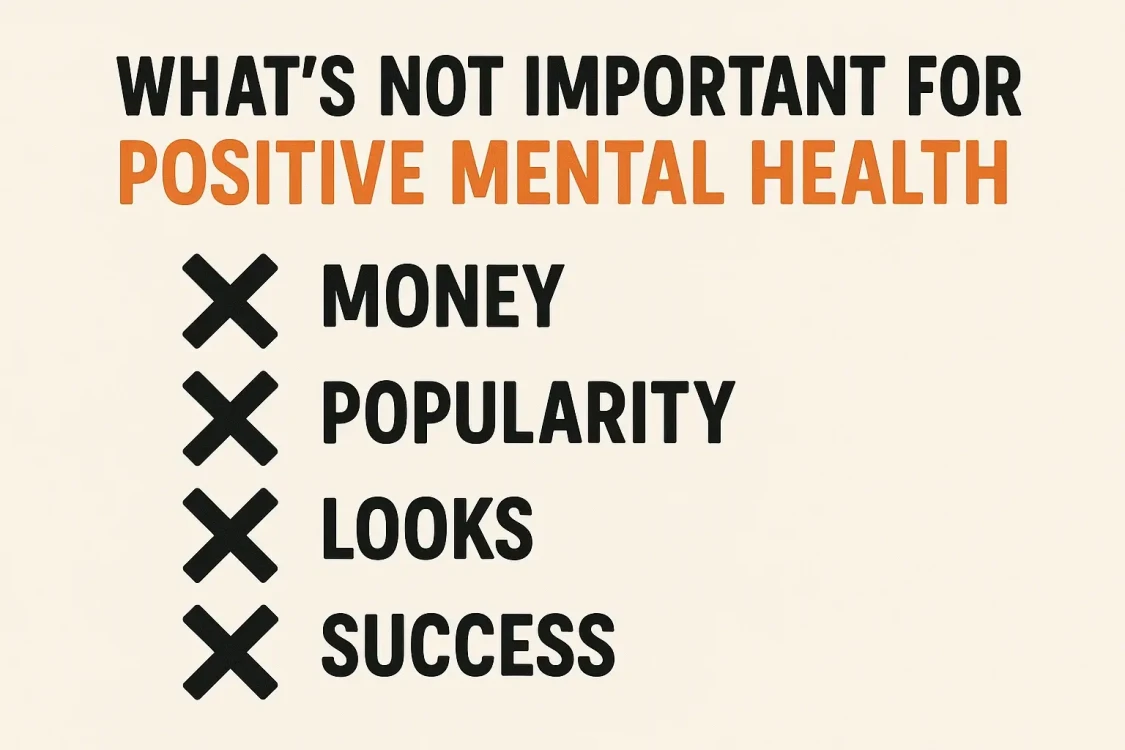
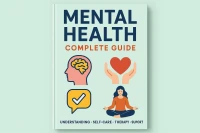
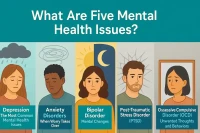


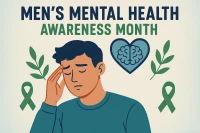
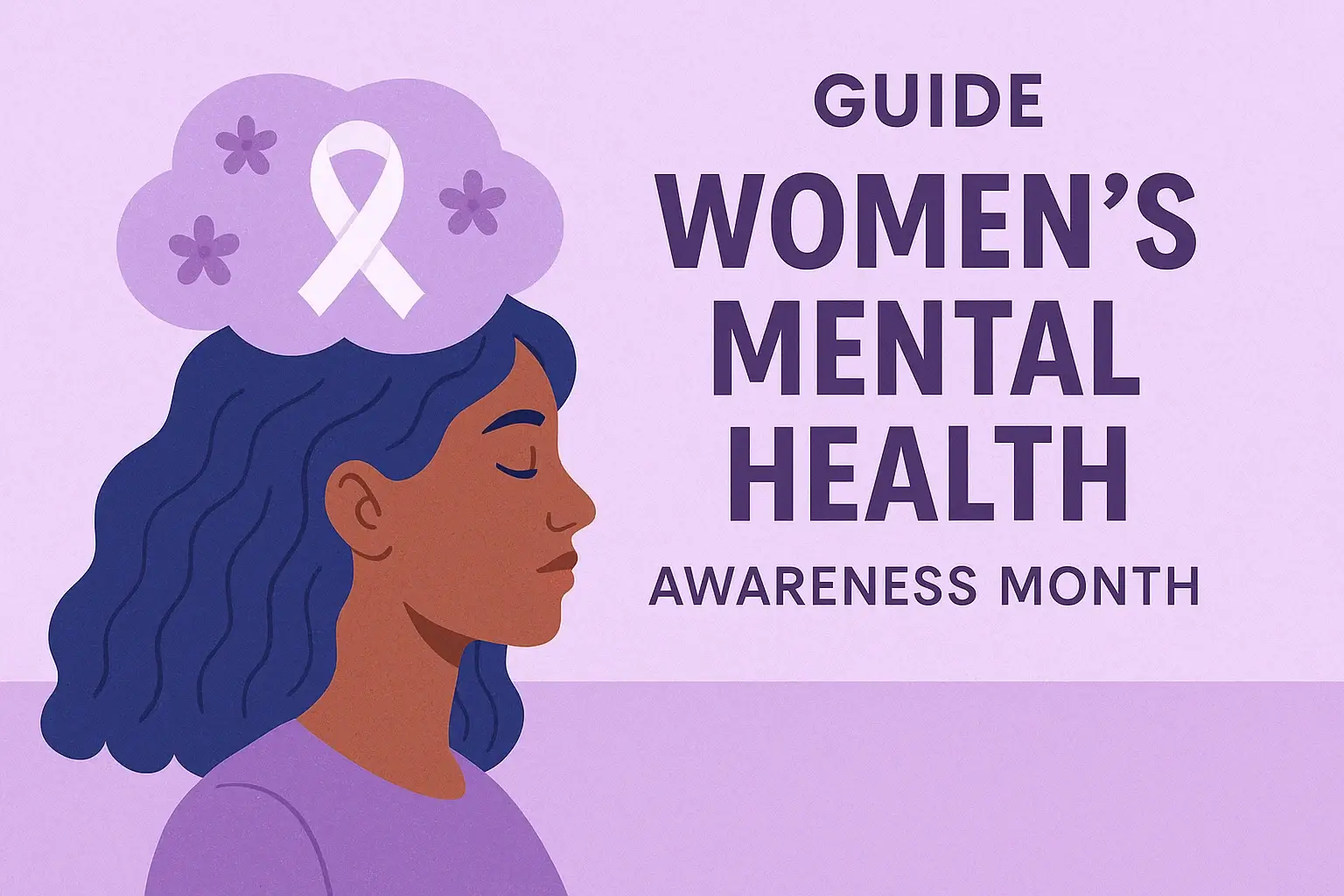
Comments